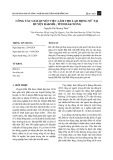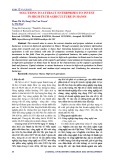
IJASOS- International E-Journal of Advances in Social Sciences, Vol. IV, Issue 12, December 2018
http://ijasos.ocerintjournals.org
708
IMPORTANCE OF HUMAN RESOURCES TO SOCIAL DEVELOPMENT
Venelin Terziev
Corresponding Member of the Russian Academy of Natural History, Moscow, Russia, Prof.
D.Sc. (Ec.), D.Sc. (National Security), D.Sc. (Social Activities), Ph.D., National Military University,
Veliko Tarnovo, Bulgaria; University of Rousse, Rousse, Bulgaria, terziev@skmat.com
Abstract
The importance of social policies and human resources for social development is a question of special
consideration in contemporary globalizing society suffering a number of problems in its social and economic
development. Current study makes analyses of the key features of the human resources and the importance
of social activity outlining the main factors triggering the change and proposing the application of the model
of „collective qualification”. The conclusion focuses on the social system management requirements born by
the environment and the need to „release” the unrevealed potentials of human resource.
Keywords: human resources, management, social policy.
1. INTRODUCTION
The key factor for socio - economic development is people. They are the foundation of social management
as a separate managerial area, the goal of which is the management of the interaction between the subject
and the object, (having their social character), occurring in a particular social environment. To what degree
the actions of the subject and the object, as elements of social management are adequate to the changes in
the environment, is determined by their activity. Moreover, the rationalization of social managerial decisions
is directly dependent on the social policy carried out.
The social policy - as a set of principles, legal norms, institutions and activities, aimed at creating conditions
ensuring the quality of life of the citizens of a country, is an expression of the social relations between the
state and its citizens. The social policy determines the safety (social, health, economic) and security of the
people in the socium. This is why it is defined as „philosophy, ideology, program for influence on the
demographic situation, employment of the population, level, way and quality of living of the population, „its
income level and structure of consumption of material and cultural wealth,... forms of social security, social
services to the population, ... providing targeted state aid to the most unprotected, the most vulnerable and
poor layers of the population,… measures aimed at creating conditions for self-defense in order to maintain
and improve the level of well-being...”.
It is noteworthy that within the scope of social policy a wide arsenal of concepts is included (social protection,
social safety, social support, social self-protection, quality of life), defined in the quoted edition. From here, in
the content of social policy are differentiated concrete actions of the state bodies, non-state institutions, and

IJASOS- International E-Journal of Advances in Social Sciences, Vol. IV, Issue 12, December 2018
http://ijasos.ocerintjournals.org
709
public associations, related to the implementation of tactical and strategic objectives for the harmonization of
public relations. Since the foundation of these relations is the people with their actions and skills, they are a
crucial factor of social policy. Inside there are synthesized and multiplied the other components of a country's
resources and thus they are transformed into a finished product in the planning of the goals for achieving
socio-economic development, making it possible to carry out an effective social policy.
Moreover, researches show that 70% of the world's wealth is in the form of human capital - the skills and
knowledge of the people and not in physical or financial capital. The strategy of many companies today is
clearly guided by the idea of human resources, stressing on individualization, service and innovation.
Put another way, human resources are the people in an organization which, by their professional and
personal qualities, make it possible to achieve its strategic objectives. Together with the rest of the
resources, they should meet the needs of the organization, and the way they are transformed into abilities,
predetermines the efficiency of their use. This means that they, human resources, together with others,
become a function, a subsystem and an object of management. The reason for this is the circumstance that
in terms of goal setting, they are a function of management. The application of the accumulated scientific
knowledge on the general theory of systems, basing on the system approach, interacting with other
management subsystems, characterizes them as a management subsystem. Through the forward and
backward informational feedback, they are a subject to management, influence for the purpose of obtaining
certain result. Therefore, human resource management (HRM) is defined as „a system of principles,
methods, tools, legal norms, rules, criteria, requirements, standards, procedures, policies, plans and
programs of formation and use of human resources in the organization, in accordance with its immediate
interests and strategic objectives”.
In other words, HRM is an activity resulting from the strategic objectives of the organization, which requires
the implementation of a strategic management approach in taking managerial decisions, related to this
resource. In this sense, the human resources are a reflection of specific social relations in the interests of
social governance, as part of a nationwide management. And in an environment of dynamic changes,
requiring the participation of human resources in the socio-economic processes, by maintaining and
developing adequate to the changes in the social environment abilities to harmonize social relations, there
are demands on establishment of an effective system of social activity, which is also the goal of the study
presented in this publication.
2. DETAILS EXPERIMENTAL
Social activity as a factor of change in public relations
The social activity is inherently associated with foresight and proactive actions. Put another way, it is directly
related to the change in social relations caused by people, by the individual. From here, „...social activity is
the realization of a particular new norm-measure of the activity, which norm-measure stands out as new in
direct comparison with the established one, with that which is considered „normal” by common sense in life.
The individual realizes this new norm-measure either in his/her own activities or in the activities of other
people, their associations, public institutions activity that generates activity”.
What is noteworthy is that the essential characteristics of social activity are the change, the activities, the
social subject, the public system, the public relations.
In all his/her actions, „the individual intentionally makes changes in the activity and its results (his/her or
someone else’s activity) and thus causes social change and creates conditions for change (progressive or
regressive)”.
Social activity is objectively and subjectively conceptualized by the individual as his/her activity for the
development of society from the position of the adopted by him/her specific team interests, ideals and ideas.
Social activity is (1) a purposeful effort on the part of the individual (2) for a significant personal contribution
to this development, (3) through the available forms and means (4) to the possible extent. And this
determines his/her public predestination, the expression of which is the alignment of the social system and
public relations with the dynamic changes in the social environment.
Since, in the basis of these projections and activities stays the subject, the human resource, led by the
private and public interest towards change, the social activity is associated with the concept of the term
interest, motivation, desire for satisfaction of needs that depend on organizational changes, the intensity of
these activities is directly dependent on the factors of the social environment. All this resides within the
scope of social management as part of the general managerial process and in connection with the
management of human resources. In order to have efficient management of social processes, it is more than
ever necessary to observe certain rules, principles which in scenes are also principles of the human

IJASOS- International E-Journal of Advances in Social Sciences, Vol. IV, Issue 12, December 2018
http://ijasos.ocerintjournals.org
710
resources management (HRM). This concerns the following:
Predictability, expression of which is in synchronizing social management with the longterm strategic
requirements and social needs;
Integration, the relevance of which is in the integration of social management in a unified framework,
which to consolidate the planned strategic goals of social policy on the basis of fair treatment of the
individual;
Synchronization, expressed in planning, organizing, coordinating the activities in social management;
Protection of information, consistent with the requirements for personal data protection, integrity and
security of information, related to the individual and the social processes;
Empathy, guaranteeing the identification of the needs of the individual and their satisfaction in a real
social environment;
Flexibility on the basis of which social management to adapt to changes in the social environment.
And all this is in the interest of the objectives and tasks of social policy, the achievement of which is a result
of the activity of the human factor, understood as an individual, a team, the society, and the relations
between the people in this team, in this society on the basis of self-awareness. And this activity, social in its
nature, is determined by certain factors- general and specific.
Amongst the general factors of social activity, special attention deserve:
The common culture, which is important for the behavior of the human factor in the team, in the society;
The special-functional culture resulting from the behavior of the individual in the realization of professional
relationships;
The motivating factors relating to the stimulation and consideration of interests of individuals in the team
and in the society.
The specific factors of social activity include:
The way of taking management decisions, while leading are these two moments - one, when it is
necessary to ensure the participation of the team, the society in the execution of the decision, and the
second, when it is important to act immediately and in a short time to achieve the intended purpose;
The way of managerial communication, while extremely important is the managerial responsibility,
manifested by the so called „Ruling Five”, illustrated by the fingers of the hand.
Through this approach the following questions receive their answers: greater pressure (the thumb); who is to
blame (the index finger); whose is the choice (the middle finger); whose are the instructions (the ring finger)
and who is in control (the little finger).
The application of this approach to managerial communication is essential in the implementation of
managerial decisions in the social sphere, which too often should be taken depending upon the particular
situation and the implementation of which is a result of the contribution of each member of the team, of the
society and their team wise interaction.
Achieving motivation in the individual sometimes determines the practice the answer to the questions of the
Ruling Five to be given „face to face” (Terziev, Georgiev, 2017, pp. 94-101; Terziev, Georgiev, 2017a, pp.
1418-1437; Terziev, Georgiev, 2017b, pp. 602-606; Terziev, Georgiev, 2017c, pp. 607-610; Terziev,
Banabakova, Ilsheva, Georgiev, 2017d, pp. 44-53; Terziev, Banabakova, Ilsheva, Georgiev, 2017e, pp. 138-
145; Terziev, Banabakova, Georgiev, 2017f, s.64-69; Terziev, Banabakova, Georgiev, 2017g, s.70-75;
Terziev, Banabakova, Georgiev, 2017h, s.76-81; Terziev, Banabakova. Georgiev, 2017i, s. 103-106;
Terziev, Banabakova., Georgiev, 2017j, s. 100-103; Terziev, Banabakova, Georgiev, 2017k, s. 97-100;
Terziev, Banabakova, Georgiev, 2017l, s. 107-110; Terziev, Banabakova, Georgiev, 2017m, s. 111-115;
Terziev, Banabakova, Georgiev, 2017n, s. 116-120; Terziev, Banabakova, Georgiev, 2017o, s. 120-124;
Terziev, Banabakova, Georgiev, 2017p, s. 125-128; Terziev, Banabakova, Georgiev, 2017q, s. 128-131;
Terziev, Banabakova, Georgiev, 2017r, s. 131-135; Terziev, Banabakova, Georgiev, 2017s, s. 135-139;
Terziev, Banabakova, Georgiev, 2017t, s. 13-16; Terziev, Banabakova, Georgiev, 2017u, s. 16-19; Terziev,
Banabakova, Georgiev, 2017v, s. 20-23).
Therefore, the understanding and consideration of these factors for the social activity of the human factor is
in the basis of the formation of managers at all levels in the managerial hierarchy of the social system

IJASOS- International E-Journal of Advances in Social Sciences, Vol. IV, Issue 12, December 2018
http://ijasos.ocerintjournals.org
711
(strategic, operational and tactical levels) with established leadership skills on the basis of collective
qualification and team work. This means forming ability for:
Management of change in the social environment by bringing together experts with different backgrounds
in the realization of the set objectives;
Linking the goals with the personal interest;
Motivating highly efficient communication between the individual experts;
Merging the collective, the social with the personal responsibility in the tasks execution;
Optimal use of the skills of the members of the team, corresponding to the nature and complexity of the
executed tasks.
3. CONCLUSION
Without claiming to be exhaustive, we believe that the application of the model of collective qualification
allows the disclosure of the potential of both the individual and the team, and the society as a whole, in
achieving the end results, united by the global objective of social management. This, according to the theory
of leadership, is the basis of focusing „on the release of human talent and realizing the potential of the
people” in managing change in the social system, in public relations, in accordance with the changes in the
social environment.
Adaptation of the model of collective qualification and team work allows defining the role and place of the
human factor in social management by the dependency „goal-results”, which is the basis of management by
result and rationalization of managerial decisions (Terziev, Georgiev, Georgiev, 2017w, pp. 295-300;
Terziev, Georgiev, Georgiev, 2017x, pp. 300-305; Terziev, Georgiev, Georgiev, 2017y, pp. 305-311; Terziev,
Georgiev, Georgiev, 2017z, pp. 311-317; Terziev, Georgiev, Georgiev, 2017aa, pp. 317-324; Terziev,
Georgiev, Georgiev, 2017ab, pp. 324-329; Terziev, Georgiev, Georgiev, 2017ac, pp. 329-335; Terziev,
Georgiev, 2018, pp. 452-461; Terziev, Georgiev, 2018a, pp. 6-15; Terziev, Banabakova, Stefanov, Georgiev,
2018b, pp. 267-272; Terziev, Banabakova, Stefanov, Georgiev, 2018c, pp. 79-87).
REFERENCE LIST
Terziev, V., Georgiev, M. (2017). Active social programs development in Bulgaria: Contemporary challenges
and social management instruments. // International Journal of Humanities and Social Science
Invention. www.ijhssi.org, 6, 2017, N 1, pp. 94-101, ISSN (Online): 2319 – 7722, ISSN (Print): 2319 –
7714.
Terziev, V., Georgiev, M. (2017a). The active model of a social programme and ITS strategic advantage. //
Medical Teacher. Тaylor & Francis, 39, 2017, N 12 (2), pp. 1418-1437, ISSN: 0142-159X (Print), ISSN:
1466-187X (Online).
Terziev, V., Georgiev, M. (2017b). Highlights of the Evolution of the 'Balanced Scorecard' idea as a model for
managing strategy development and control. // IJASOS- International E-journal of Advances in Social
Sciences, OCERINT International Organization Center Of Academic Research, 3, 2017, N 8, pp. 602-
606, e-ISSN: 2411-183X.
Terziev, V., Georgiev, M. (2017c). Highlights of the evolution of the 'Balanced Scorecard' idea as a model for
managing strategy development and control. // SOCIOINT 2017- 4th International Conference on
Education, Social Sciences and Humanities 10-12 July 2017- Dubai, UAE, OCERINT- International
Organization Center of Academic Research, 2017, pp. 607-610, ISBN: 978-605-82433-1-6.
Terziev, V., Banabakova, V., Ilsheva, M. Georgiev, M. (2017d). Motivation and stimulation of workers as a
basic aspect of the organization. // Scientific journal «Economics and finance». GPG Publishing
Group, Pretoria, South Africa, Challenges and opportunities of scientific thought development:
Collection of scientific articles, 2017, pp. 44-53, ISBN 978-0-9942661-6-3.
Terziev, V., Banabakova, V., Ilsheva, M., Georgiev, M. (2017e). Controlling as a management function of the
organization. // Scientific journal «Economics and finance». GPG Publishing Group, Pretoria, South
Africa, Challenges and opportunities of scientific thought development: Collection of scientific articles,

IJASOS- International E-Journal of Advances in Social Sciences, Vol. IV, Issue 12, December 2018
http://ijasos.ocerintjournals.org
712
2017, pp. 138-145, ISBN 978-0-9942661-6-3.
Terziev, V., Banabakova, V., Georgiev, M. (2017f). Razvitie i perestrukturirovanie zanyatosti v Bolgarii s
nachala perehoda k raynochnoy ekonomike i v goday evropeyskoy integratsii. // Gromadsyka
organіzatsіya «Kiїvsykiy ekonomіchniy naukoviy tsentr» Zbіrnik materіalіv vseukraїnsykoї naukovo-
praktichnoї konferentsії «Pіdpriєmnitstvo, buhgaltersykiy oblіk ta fіnansi: natsіonalynі osoblivostі ta
svіtovі tendentsії» 15-16 veresnya 2017 roku, Kiїv 2017, s.64-69 (Терзиев. В, Банабакова. В.,
Георгиев, М. Развитие и переструктурирование занятости в Болгарии с начала перехода к
рыночной экономике и в годы европейской интеграции. // Громадська організація «Київський
економічний науковий центр» Збірник матеріалів всеукраїнської науково-практичної конференції
«Підприємництво, бухгалтерський облік та фінанси: національні особливості та світові
тенденції» 15-16 вересня 2017 року, Київ 2017, с.64-69).
Terziev, V., Banabakova, V., Georgiev, M. (2017g). Razvitie i perestrukturirovanie zanyatosti v Bolgarii. //
Gromadsyka organіzatsіya «Kiїvsykiy ekonomіchniy naukoviy tsentr» Zbіrnik materіalіv vseukraїnsykoї
naukovo-praktichnoї konferentsії «Pіdpriєmnitstvo, buhgaltersykiy oblіk ta fіnansi: natsіonalynі
osoblivostі ta svіtovі tendentsії» 15-16 veresnya 2017 roku, Kiїv 2017, s.70-75 (Терзиев. В,
Банабакова. В., Георгиев, М. Развитие и переструктурирование занятости в Болгарии. //
Громадська організація «Київський економічний науковий центр» Збірник матеріалів
всеукраїнської науково-практичної конференції «Підприємництво, бухгалтерський облік та
фінанси: національні особливості та світові тенденції» 15-16 вересня 2017 року, Київ 2017, с.70-
75).
Terziev, V., Banabakova, V., Georgiev, M. (2017h). Politiki dlya vozdeystviya i analiz sostoyaniya na raynok
truda. // Gromadsyka organіzatsіya «Kiїvsykiy ekonomіchniy naukoviy tsentr» Zbіrnik materіalіv
vseukraїnsykoї naukovo-praktichnoї konferentsії «Pіdpriєmnitstvo, buhgaltersykiy oblіk ta fіnansi:
natsіonalynі osoblivostі ta svіtovі tendentsії» 15-16 veresnya 2017 roku, Kiїv 2017, s.76-81 (Терзиев.
В, Банабакова. В., Георгиев, М. Политики для воздействия и анализ состояния на рынок труда.
// Громадська організація «Київський економічний науковий центр» Збірник матеріалів
всеукраїнської науково-практичної конференції «Підприємництво, бухгалтерський облік та
фінанси: національні особливості та світові тенденції» 15-16 вересня 2017 року, Київ 2017. с.76-
81).
Terziev, V., Banabakova, V., Georgiev, M. (2017i). Razvitie kontseptsii sotsialynoy ekonomiki. // Materіali
dopovіdey mіzhnarodnoї naukovo - praktichnoї konferentsії «Suchasnі mozhlivostі zabezpechennya
sotsіalyno-ekonomіchnogo rozvitku kraїn» 16 veresnya 2017 roku, Mіnіsterstvo osvіti і nauki Ukraїni,
Uzhgorodsykiy natsіonalyniy unіversitet, Fakulytet mіzhnarodnih ekonomіchnih vіdnosin,
Ekonomіchniy fakulytet, Іnstitut derzhavnogo upravlіnnya ta regіonalynogo rozvitku, Uzhgorod, 2017,
s. 103-106, ISBN 978-966-916-348-6 (Терзиев. В, Банабакова. В., Георгиев, М. Развитие
концепции социальной экономики. // Матеріали доповідей міжнародної науково - практичної
конференції «Сучасні можливості забезпечення соціально-економічного розвитку країн» 16
вересня 2017 року, Міністерство освіти і науки України, Ужгородський національний університет,
Факультет міжнародних економічних відносин, Економічний факультет, Інститут державного
управління та регіонального розвитку, Ужгород, 2017, с. 103-106, ISBN 978-966-916-348-6).
Terziev, V., Banabakova, V., Georgiev, M. (2017j). Osobennosti, institutsii i znachenie razvitiya raynka truda.
Materіali dopovіdey mіzhnarodnoї naukovo - praktichnoї konferentsії «Suchasnі mozhlivostі
zabezpechennya sotsіalyno-ekonomіchnogo rozvitku kraїn» 16 veresnya 2017 roku, Mіnіsterstvo
osvіti і nauki Ukraїni, Uzhgorodsykiy natsіonalyniy unіversitet, Fakulytet mіzhnarodnih ekonomіchnih
vіdnosin, Ekonomіchniy fakulytet, Іnstitut derzhavnogo upravlіnnya ta regіonalynogo rozvitku,
Uzhgorod, 2017, s. 100-103, ISBN 978-966-916-348-6 (Терзиев. В, Банабакова. В., Георгиев, М.
Особенности, институции и значение развития рынка труда. Матеріали доповідей міжнародної
науково - практичної конференції «Сучасні можливості забезпечення соціально-економічного
розвитку країн» 16 вересня 2017 року, Міністерство освіти і науки України, Ужгородський
національний університет, Факультет міжнародних економічних відносин, Економічний
факультет, Інститут державного управління та регіонального розвитку, Ужгород, 2017, с. 100-
103, ISBN 978-966-916-348-6).
T Terziev, V., Banabakova, V., Georgiev, M. (2017k). Osobennosti, institutsii i znachenie razvitiya raynka
truda dlya dostizheniya ustoychivogo ekonomicheskogo i sotsialynogo razvitiya. // Materіali dopovіdey
mіzhnarodnoї naukovo - praktichnoї konferentsії «Suchasnі mozhlivostі zabezpechennya sotsіalyno-
ekonomіchnogo rozvitku kraїn» 16 veresnya 2017 roku, Mіnіsterstvo osvіti і nauki Ukraїni,
Uzhgorodsykiy natsіonalyniy unіversitet, Fakulytet mіzhnarodnih ekonomіchnih vіdnosin,





![Tài liệu tập huấn, bồi dưỡng dân số và phát triển cho Ban Chỉ đạo Dân số và Phát triển các cấp [Mới nhất]](https://cdn.tailieu.vn/images/document/thumbnail/2025/20250422/gaupanda088/135x160/3121745286674.jpg)




















